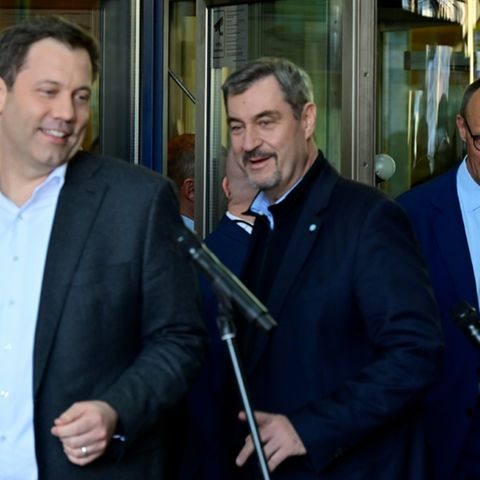Tough government formation
Trump wages a trade war – and Merz dives off
Copy the current link
Add to the memorial list
The AfD puts pressure, Trump’s tariffs cloud the economic outlook: in the CDU and SPD the impatience grows with the black and red negotiators. When is the coalition agreement?
Friedrich Merz traveled home to the Sauerland for around 24 hours this weekend. Briefly meet the family, take a breath – then we go back to Berlin by car. Time is pushing. The country finally needs a new government.
Until Wednesday, the Union and SPD would like to reach an agreement on the coalition agreement. And over the weekend, the pressure on the negotiators has grown again. The already cloudy economic prospects have become even worse by Donald Trump’s trade war. And it is boiling in the Union. The AfD is closer in surveys, it was even on par with the Institut Insa for the first time, with 24 percent devastating for CDU/CSU.
Accordingly, the calls become louder, the CDU manuscript must be more recognizable in the black and red contract. “It won’t work that way,” accused the former constitutional judge Peter Müller in a sobering interim balance for the “Süddeutsche”.
What does Merz want to respond to Trump?
The “thick Klopper” would still have to be negotiated, says Alexander Dobrindt, the CSU state group leader. And the Merz confidante Thorsten Frei promises: “The restart will be felt in every village and in every city.” They are silent about details. Everyone knows: the contract must sit, otherwise Merz is on the cut -up seat in the Chancellery.
Trump’s tariffs in particular threaten to confuse the talks between the Union and the SPD, they tighten the problem, possibly also the conflict between the negotiators. Germany is likely to be one of the most important trading partners in the United States to feel the consequences of tariffs. Consumers have to protect against a new wave of inflation, jobs have to be secured, the economy needs relief, probably also over lower taxes. But how could they be financed without increasing taxes elsewhere? And anyway: what should the German and European response to Trump’s tariffs look like?
Merz has dipped, also by Lars Klingbeil, the SPD leader, nothing was heard over the weekend. At a time when Germany’s role in Brussels is concerned, Berlin is in a state of limb.
Oettinger demands digital tax
In the Union and the SPD, the impatience grows. Former EU Commissioner Günther Oettinger is pushing for “a far-reaching package with counter-tariffs against US products”. “There should also be a fee on digital services. This would particularly affect tech giants like Amazon or Elon Musks X,” said the CDU politician star. “Of course, a digital tax would make the product more expensive for users, but conversely, the earnings and profits of the large platforms would also make. The amount of the fee should depend on the intensity of use.”
Verena Hubertz, the SPD vice parliamentary group leader, can also imagine a digital tax. “If we succeed in finding a measure that hits US companies without damaging the European digital economy, I am very much for it,” she told that star. “President Trump should not confuse military power with trade power.”
The problem: What Brussels is decisive could have significant repercussions on the German market. For this reason alone, the prospective federal government would have to interfere. Jörg Kukies, the managing SPD finance minister, warned in the of “T-Online” to simply raise EU package tariffs himself. He campaigned for a “selective procedure” and a precise analysis along the question of where there is a benefit – and “where we harm ourselves”.
Call new free trade agreements – also with Trump
There are other ideas in the CDU. “The new federal government has to put the expansion of free trade with South America and Asia on their agenda,” demands the CDU economic politician Christoph Ploß. No less, but more free trade is now necessary, he told that star. “The Mercosur Agreement must be ratified immediately and the free trade agreements discussed for years with India and Indonesia should now be agreed as soon as possible.”
The Kukies looks similar. Already in the exploratory paper it was included that Germany works for a new free trade agreement between the European Union and the United States. Now is the right time to break the logic of ever higher tariffs, he says. “With a free trade agreement, all of these questions are united and solved in a document.”
Union and SPD want to continue negotiating on Monday, and the EU Minister of Commerce meet at the same time. The tariffs and the question of the reaction to US policy are likely to become central in the last talks between the Union and the SPD. From April 9, Trump’s 20 percent surcharge for goods and services from the EU.
That is just that Wednesday, on which Union and SPD actually want to get through with their negotiations.
Source: Stern
I have been working in the news industry for over 6 years, first as a reporter and now as an editor. I have covered politics extensively, and my work has appeared in major newspapers and online news outlets around the world. In addition to my writing, I also contribute regularly to 24 Hours World.





